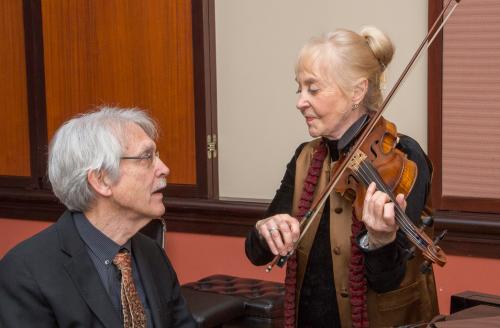- Music
- About
- Composition and Theory
- Music Technology
- History and Culture
- Performance
- Degree Requirements
- Class Schedule
- Edward and Joyce Linde Music Building
- Graduate Level Courses
- Theater Arts
- News
- Events
- People
- View/Listen
- Space/Resources
- Give


 This concert by composer John Harbison, 2016 recipient of the Kepes Prize, will feature:
This concert by composer John Harbison, 2016 recipient of the Kepes Prize, will feature:
Bach, Sonata for Violin and Continuo, BWV 1023
Mozart, Sonata in A Major for Violin and Piano, K. 526
Harbison, Sonata No. 2 for Violin and Piano (First Boston Performance)
Performed by Rose Mary Harbison, violin, and John Harbison, piano.
Also on the program are songs by Van Heusen and first performances of three songs by Harbison performed by Strength In Numbers (SIN): Evan Ziporyn, reeds; Dylan Sherry, tenor sax; Mark Harvey, trumpet; John Harbison, piano; Keala Kaumeheiwa, bass; Fred Harris, drums; joined by special guests Rose Mary Harbison, violin, and Liz Tobias, vocals.
The György Kepes Fellowship Prize
The prize was established in 1982 by the Council for the Arts at MIT to encourage and celebrate individuals at the Institute whose creative work reflects the vision and values of György Kepes (1906-2002). Founder of MIT’s Center for Advanced Visual Studies, György Kepes revealed fundamental relations between art and science, and art and the physical environment. The Kepes Fellowship Prize is presented to a member of the MIT community who has demonstrated excellence in the creative arts: architecture, visual and performing arts, and writing.
John Harbison, recipient of the 2016 Kepes Prize
Composer John Harbison is among America's most distinguished artistic figures. The recipient of numerous awards and honors, among them a MacArthur and a Pulitzer, Harbison has composed music for most of America's premiere musical institutions, including the Metropolitan Opera, Chicago Symphony, Boston Symphony, New York Philharmonic, and the Chamber Music Society of Lincoln Center. His catalog includes three operas, six symphonies, twelve concerti, a ballet, five string quartets, numerous song cycles and chamber works, and a large body of sacred music that includes cantatas, motets, and the orchestral-choral works Four Psalms, Requiem and Abraham. Recent premieres of his music include Seven Poems of Lorine Niedecker, String Trio, For Violin Alone, and Supper at Emmaus. Harbison’s current composition projects include a work for cello and strings, a clarinet trio, Longfellow settings for viols and countertenor, his sixth string quartet, and a monodrama. His opera The Great Gatsby recently received its European premiere at Semperoper Dresden where a revival is planned for May 2017.
Harbison has been composer-in-residence with the Pittsburgh Symphony, the Los Angeles Philharmonic, the American Academy in Rome, and numerous festivals. He received degrees from Harvard and Princeton before joining the MIT faculty, where he is currently Institute Professor. For many summers since 1984 he taught composition at Tanglewood, serving as head of the composition program there from 2005-2015, often also directing its Festival of Contemporary Music. With Rose Mary Harbison, he has been co-Artistic Director of the annual Token Creek Chamber Music Festival since it’s founding in 1989. He continues as principal guest conductor at Emmanuel Music. (where for three years he served as Acting Artistic Director). He was President of the Copland Fund for fifteen years, and a trustee of the American Academy in Rome. He is a member of the American Academy of Arts and Letters and is a Trustee of the Bogliasco Foundation. His music is published exclusively by Associated Music Publishers.
This event is co sponsored by Music and Theater Arts and the Council for the Arts at MIT.
About the Council for the Arts at MIT
The Council for the Arts at MIT (CAMIT) was founded in 1972 by president Jerome B. Wiesner, and is an international volunteer group of alumni and friends established to support the arts at the Massachusetts Institute of Technology. With its enthusiastic advocacy for all the arts at MIT, the Council’s mission is to act as a catalyst for the development of a broadly based, highly participatory program in the arts, firmly founded on teaching, practice, and research at the Institute, and to conduct arts-related fundraising activities on behalf of MIT.